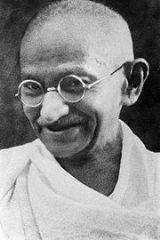
during the Indian independence movement
. A pioneer of satyagraha
, or resistance to tyranny through mass civil disobedience
—a philosophy firmly founded upon ahimsa
, or total nonviolence
—Gandhi led India to independence
and inspired movements for civil rights and freedom across the world.
In this instance of the fire-arms, the Asiatic has been most improperly bracketed with the natives. The British Indian does not need any such restrictions as are imposed by the Bill on the natives regarding the carrying of fire-arms. The prominent race can remain so by preventing the native from arming himself. Is there a slightest vestige of justification for so preventing the British Indian?![]()
Victory attained by violence is tantamount to a defeat, for it is momentary.![]()
I came in contact with every known Indian anarchist in London. Their bravery impressed me, but I felt that their zeal was misguided. I felt that violence was no remedy for India's ills, and that her civilisation required the use of a different and higher weapon for self-protection.![]()
If India adopted the doctrine of love as an active part of her religion and introduced it in her politics. Swaraj|Swaraj would descent upon India from heaven. But I am painfully aware that that event is far off as yet.![]()
I have even seen the writings suggesting that I am playing a deep game, that I am using the present turmoil to foist my fads on India, and am making religious experiments at India's expense. I can only answer that Satyagraha|Satyagraha is made of sterner stuff. There is nothing reserved and nothing secret in it.![]()
If one has no affection for a person or a system, one should feel free to give the fullest expression to his disaffection so long as he does not contemplate, promote, or incite violence.![]()
Nonviolence is the first article of my faith. It is also the last article of my creed.![]()

